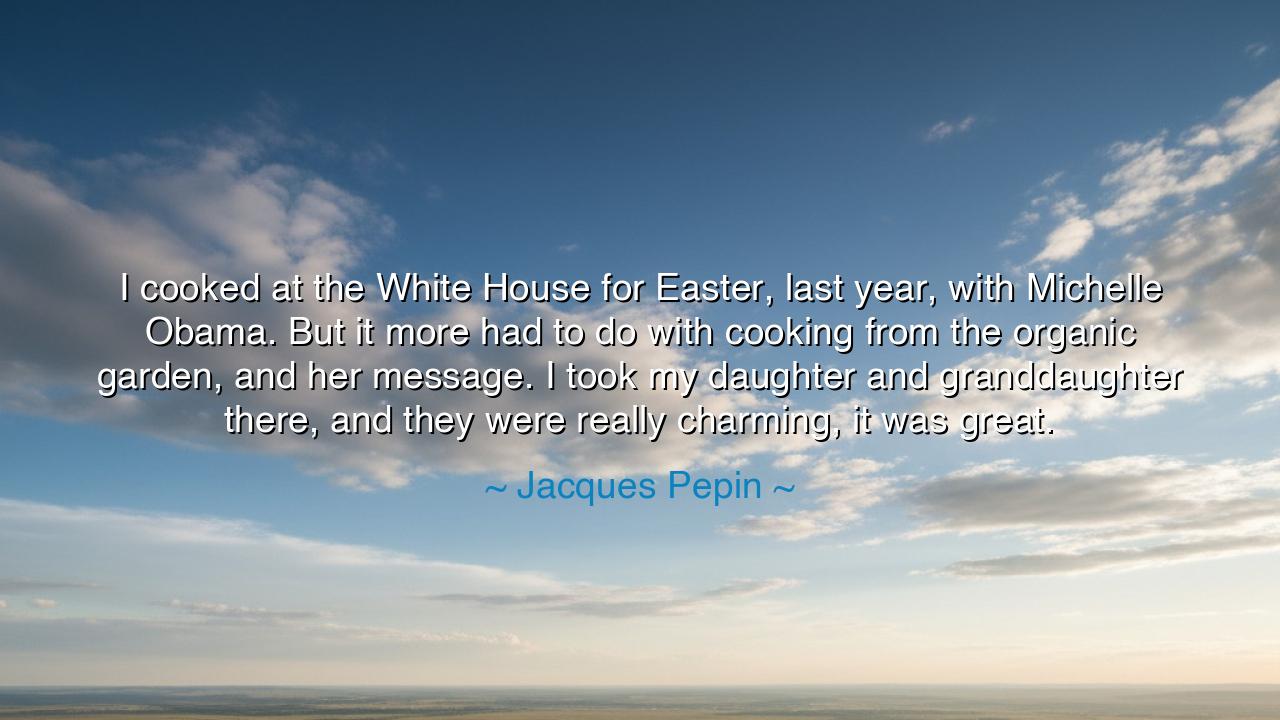
I cooked at the White House for Easter, last year, with Michelle
I cooked at the White House for Easter, last year, with Michelle Obama. But it more had to do with cooking from the organic garden, and her message. I took my daughter and granddaughter there, and they were really charming, it was great.






In the gentle yet profound words of Jacques Pépin, we glimpse not only a moment of culinary grace, but a reflection on harmony between craft, family, and purpose: “I cooked at the White House for Easter, last year, with Michelle Obama. But it more had to do with cooking from the organic garden, and her message. I took my daughter and granddaughter there, and they were really charming, it was great.” At first glance, it is a simple recollection — a chef describing a joyful day at the seat of power. Yet beneath its warmth lies a lesson as old as civilization itself: that food is more than sustenance, it is a bridge — between generations, between humanity and nature, between power and humility.
To understand the origin of this moment, we must look to two figures — Jacques Pépin, the French-born master of cuisine, and Michelle Obama, the First Lady whose advocacy for health and education reshaped the American relationship with food. When Pépin cooked at the White House for Easter, it was not a display of opulence, but a celebration of simplicity — a feast born from the organic garden that Michelle had cultivated on the White House lawn. This garden was not merely symbolic; it represented a turning of hearts back toward the earth, a revival of gratitude for the soil that nourishes all life. In joining her, Pépin — a man who spent a lifetime perfecting flavor and form — aligned himself with a deeper message: that mastery must always bow to meaning.
This encounter between chef and stateswoman mirrors an older story from the chronicles of wisdom. In the courts of ancient China, the philosopher Confucius spoke of “rectifying the heart through the rituals of daily life.” To him, even the act of preparing a meal could become sacred when done with reverence. He believed that harmony between man and nature was the foundation of virtue — and that those who governed wisely should eat simply, in respect for the earth that sustains their people. So too, in Pépin’s experience, the grandeur of the White House did not eclipse the humble beauty of the garden. He, a master of haute cuisine, found joy not in indulgence but in honoring the purity of natural ingredients, and in sharing that joy with his family — his daughter and granddaughter — the next generations of his legacy.
It is no small thing that Pépin mentions his daughter and granddaughter with such affection. Their presence transforms the moment from a professional triumph into a spiritual inheritance. For the true meaning of craftsmanship — whether in cooking, art, or leadership — is not to impress, but to pass wisdom forward. The Easter meal they prepared that day, born from an organic garden and seasoned with love, became a living parable: that the simplest acts, when guided by purpose and shared across generations, can outshine the grandest ceremonies. The laughter of family in the halls of power, the scent of herbs gathered by hand — these are the small miracles that sustain the human soul far more than status or acclaim.
In this way, Pépin’s reflection is not just about food; it is about connection. He reminds us that food carries stories — of the earth that yields it, the hands that prepare it, and the hearts that gather around it. When Michelle Obama planted her garden, she sowed not only vegetables but values: health, sustainability, and community. When Pépin cooked from that garden, he reaffirmed that message, showing that true artistry is service — service to nature, to tradition, and to the human family. Together, their act was a gesture of unity, a reminder that the art of nourishment begins long before the plate, in the tender act of cultivating life.
Throughout history, the greatest feasts have always been those that united rather than divided. Consider the First Thanksgiving, where Native Americans and settlers shared harvests in fragile peace. Or the monastic kitchens of medieval Europe, where monks fed the poor with the same care they gave to kings. These moments remind us that food, when rooted in love and understanding, becomes an expression of gratitude — a form of prayer. Pépin’s Easter feast, humble and luminous, belongs to this lineage. His joy was not in cooking for presidents, but in celebrating the sacred rhythm of seed and soil, labor and love.
The lesson of his words is this: in all things — whether you lead a nation or stir a pot — remember that knowledge and skill are empty without heart. Let your work honor both the earth and those you share it with. Cook, create, or labor not for applause, but to nourish life — the life of your body, your spirit, and your community. Cherish simplicity, for in simplicity lies truth. And above all, never forget, as Pépin did not forget, to bring your loved ones with you on the journey — for joy is fullest only when shared.
So let us take his reflection as a quiet but enduring commandment: to return to the garden, both literal and spiritual — to the roots of creation where all things begin. Whether through food, art, or kindness, let us cultivate what is pure, share it with gratitude, and pass it forward. For in doing so, we honor not only our ancestors, but the generations yet to come — those who will inherit the garden we tend today.






AAdministratorAdministrator
Welcome, honored guests. Please leave a comment, we will respond soon